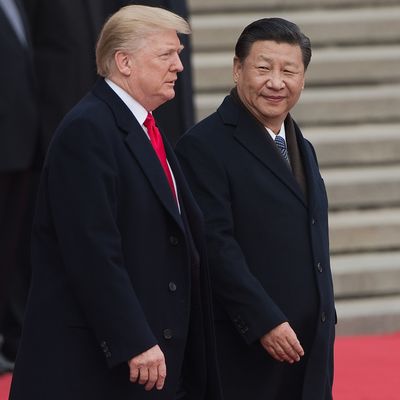
Back in August, President Trump bragged that his policies were damaging the Chinese economy:
Now, Apple has announced that slowing consumer demand in China is hurting its sales growth. Apple cut its quarterly sales forecast by $5 billion, an announcement that pushed its stock price down by over 10 percent. The broader stock market is down nearly 2 percent today.
And the president’s top economic adviser, Kevin Hassett, says there is more of the same to come.
“There are a heck of a lot of U.S. companies that have sales in China that are going to be watching their earnings being downgraded next year until we get a deal with China,” said Hassett, the chairman of the Council of Economic Advisers, on CNN today.
This is the insanity of the president’s trade war policy: it’s negative-sum. The president is probably right that China has more to lose in a trade war than we do. Their economy is more dependent on trade with us than ours is on trade with them. But we are still both dependent on each other, and when China doesn’t export as much to the U.S., Chinese consumers have less income and can’t afford to buy as much from U.S. companies. Just because China loses does not mean we win.
The blowback to U.S. firms is so blatantly foreseeable, Trump’s own economic adviser is going on television and saying his policy is going to reduce corporate profits.
I wrote a couple of weeks ago about the strange disconnect between financial markets and economic data: Financial markets have tanked, indicating big worries about future growth, but the actual data about output and wages and employment doesn’t look so bad. What gives?
Well, as Bloomberg put it in a headline this morning, “Bad Stuff the Stock Market Worried About Is Starting to Happen.” The Apple announcement was part of that “bad stuff”; another part was a very bad figure on U.S. factory output released this morning. This aligns with one of the theories I laid out: that the economy is weakening, and market participants know it, but the weakened performance has not yet shown up in lagging economic data.
In addition to stocks, long-term interest rates have fallen significantly today, which is a sign that the president may get his wish regarding monetary policy: fewer interest-rate hikes down the road. But he’s likely to get it not for the reasons he wants, but because weaker economic performance will reduce the Fed’s capacity to hike rates.
Not all of this is within the president’s control. But part of it — the trade war policy his own economic adviser admits is creating headwinds for the stock market and for U.S.-based multinational companies — is voluntary on his part. If he wants higher stock prices, all he has to do is call off the war.





























